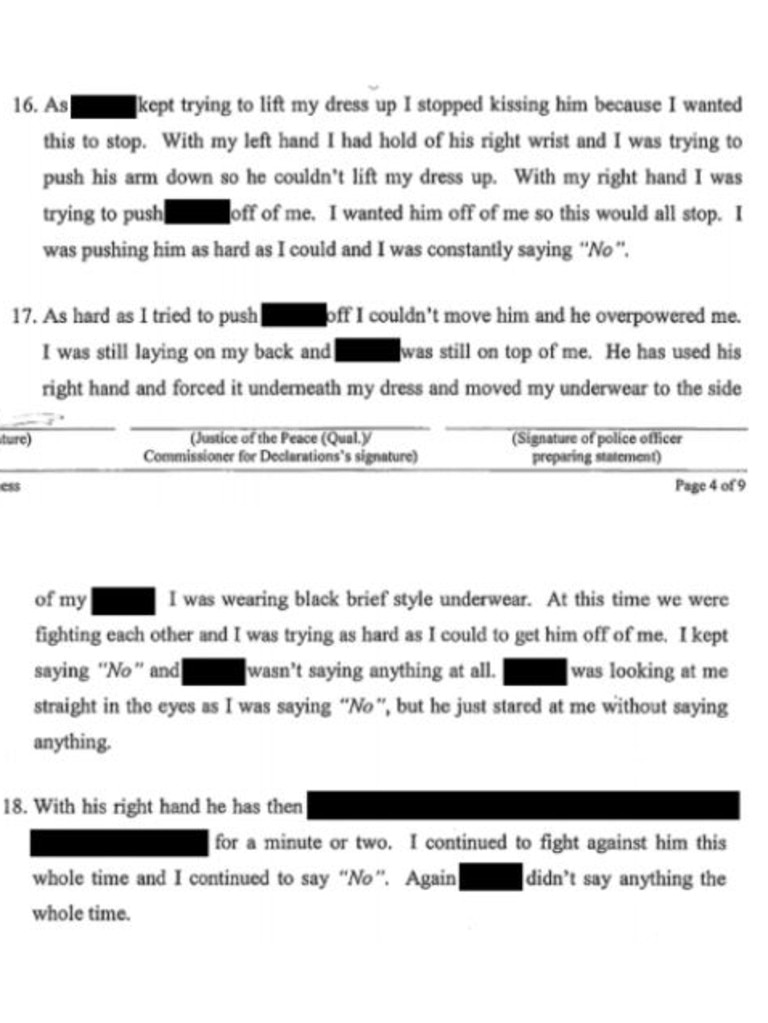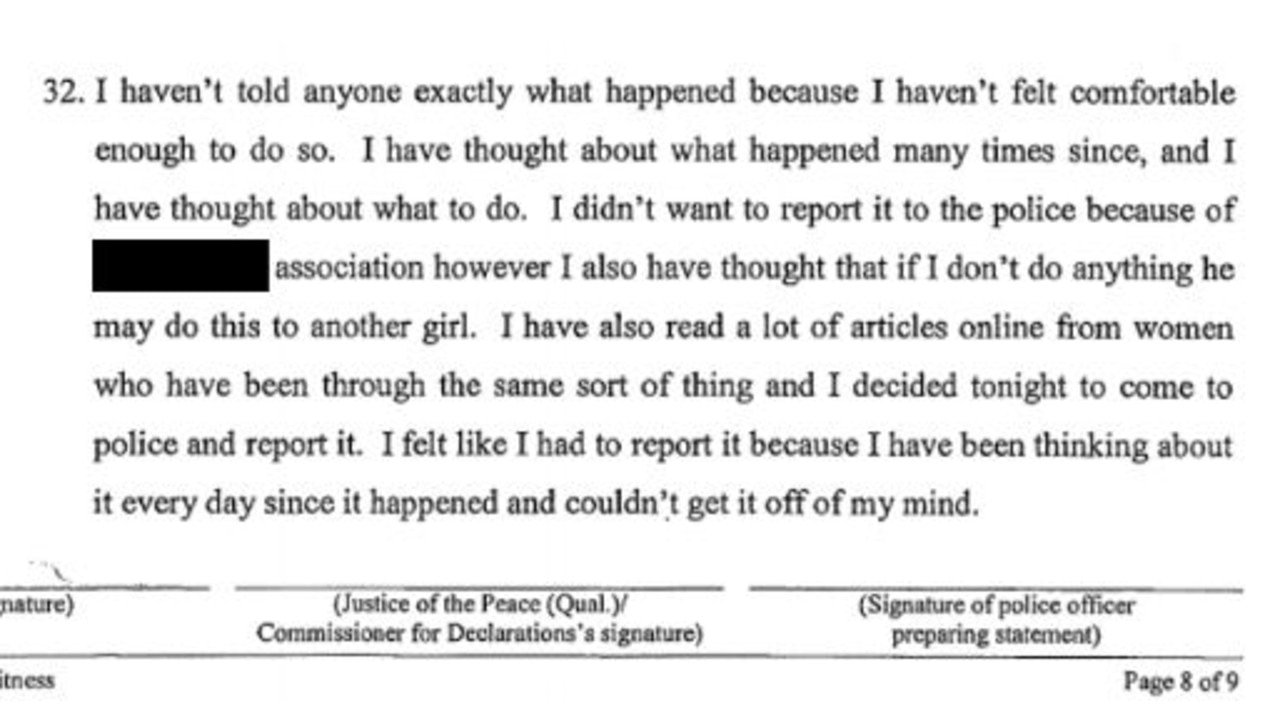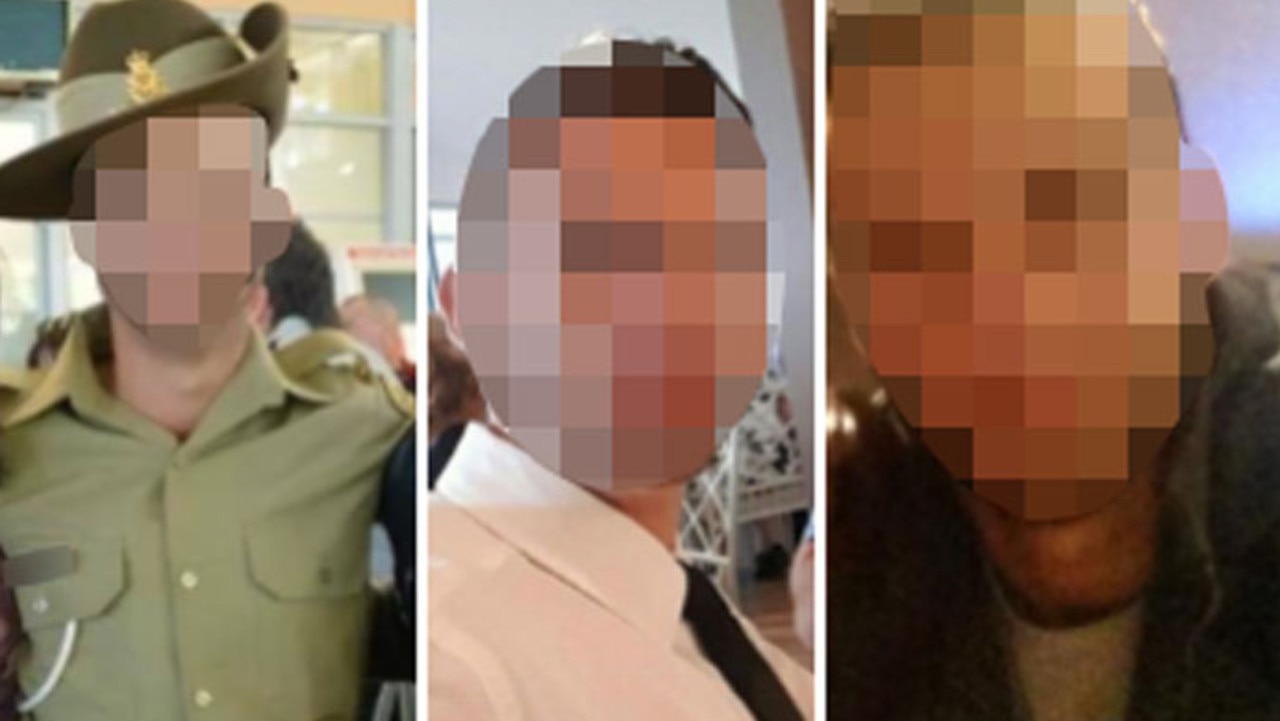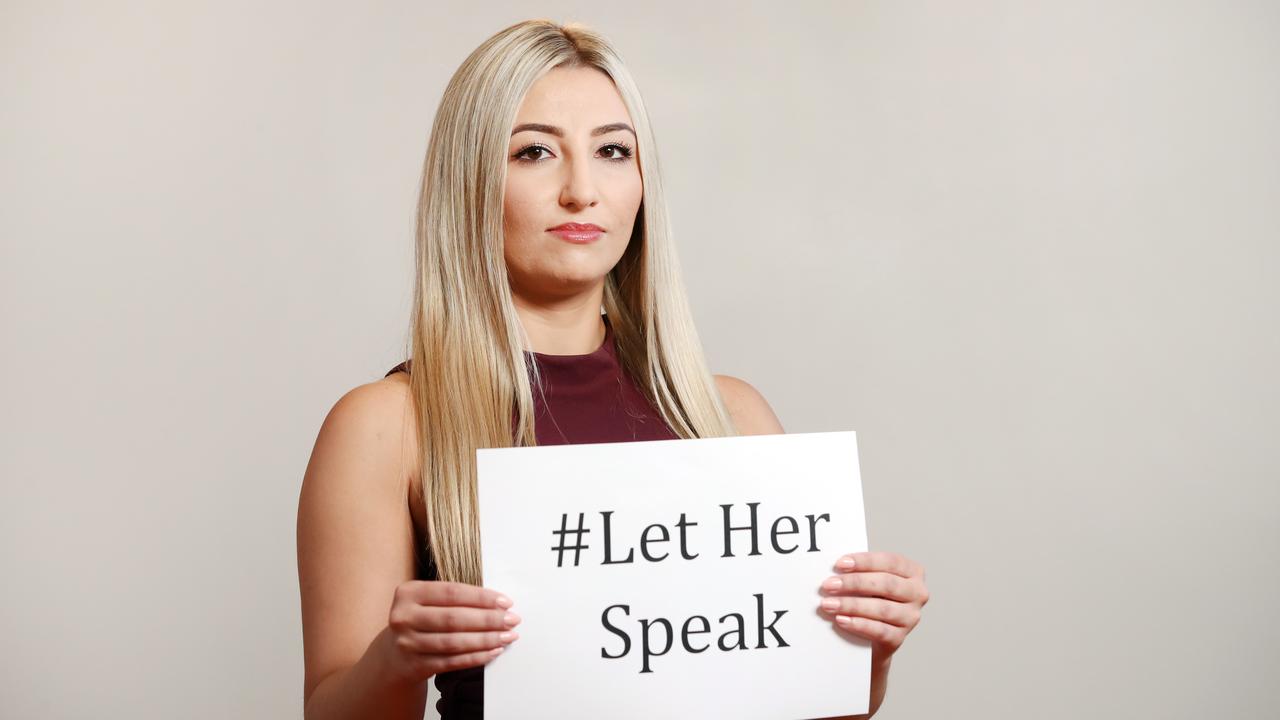#LetHerSpeak: Rape survivor breaks silence after NT gag law reform
A soldier who invited a woman back to his barracks before sexually assaulting her also attacked another woman.
EXCLUSIVE
When Lavinia Duga discovered that the soldier charged with raping her and one other woman would not be spending a night behind bars, she thought the criminal justice system was broken. Then she found out that she could face six months behind bars if she revealed her own name in the media. Her incredible story is revealed for the first time today as part of news.com.au’s #LetHerSpeak coverage.
In November 2017, Lavinia Duga walked into Southport Police station on Queensland’s Gold Coast. She was there to report a rape.
Weeks earlier, the then 26-year-old had taken a four-day business trip to Darwin. A family friend she knew through church had offered to play tour-guide.
“I knew his family, including his brothers, cousins, and parents” Lavinia told news.com.au
“He worked as a soldier at Robertson Barracks and he told me that he was going to show me around Darwin. He said that with him, I’m ‘in good hands’, so I trusted this person.”
RELATED: Read Lavinia Duga’s powerful victim impact statement
RELATED: NT law reform divides survivors

After a couple of days of sightseeing, the soldier suggested he take Lavinia to a hidden swimming spot where there were no crocodiles.
“He said we just had to stop off at the army barracks to pick up some friends.”
But once the pair arrived at the barracks – almost an hour away from Darwin – the plan unexpectedly changed.
“That’s when I knew something was wrong,” she said.
“I was in the middle of nowhere. There weren’t any women around. There was no phone coverage. It was a very isolated place.”
Inside, the soldier began kissing her.
“I was happy to kiss him at first and we kissed for a minute or two while standing.
“Then he pushed me onto the bed. I was laying on my back and he was on top of me.
“I had already made it clear that I didn’t want to have sex. He’s from the same faith and he knew my views,” Lavinia said.
But the soldier began to push further. “I was wearing a dress that was fitted at the top and a little bit looser from the waist down.
“(He) kept trying to lift my dress up and I kept pushing it down and telling him ‘No’.
RELATED: Woman’s horrific rape at work revealed
RELATED: Tassie gang rape victim speaks out

“I kept saying ‘No’. (He) wasn’t saying anything at all. (He) was looking at me straight in the eyes as I was saying ‘No’ but he just stared at me without saying anything.
“He was like a completely different person.
“It was causing me pain inside and I was yelling at him to stop. I yelled that it was hurting me and he finally let me go.”
Lavinia stood up and walked to the bathroom.
“I was feeling internal pain and I could also feel pain on the inside of my thighs” she said.
“I just looked at myself in the mirror. I couldn’t stop shaking.”
The following day, Lavinia flew home to Queensland. For weeks she couldn’t sleep.
“I was worried that people wouldn’t believe me. I was worried about the church and our family friendship.”
Finally she decided she couldn’t live with herself if she didn’t report the matter to police.
HE COULD DO THIS TO ANOTHER GIRL
In November 2017, the month following the assault, she phoned Darwin police and was advised to visit her local police station in person. There, she made a police statement alleging she’d been raped at Robertson Barracks. In one part it reads:
“I haven’t told anyone exactly what happened because I haven’t felt comfortable enough to do so. I have thought about what happened many times and I have thought about what to do. I didn’t want to report it to police because of (a mutual) association however I also have thought that if I don’t do anything he may do this to another girl … I have been thinking about it every day since it happened.”

Over two phone conversations recorded by police, the man admitted to sexually penetrating Lavinia. He admitted that he knew she repeatedly said “no” and that he did not stop at that time.
But he claimed to have “no idea” that she wasn’t consenting, instead suggesting that he interpreted her repeated “no’s” as more of a “cheeky no”.
When Lavinia objected, telling him that she had struggled and that she had bruises on her body the following day, he asked her if she “bruise(d) easy”.
Lavinia, who stands exactly five feet, zero inches tall then received text messages from the soldier stating: “You go to the gym every day”, “I’m not a big guy”, “How did I pin you down?”, I would’ve noticed if you were struggling.”

Rape and Domestic Violence Services Australia executive officer Karen Willis said that these comments are typical in sexual abuse cases.
“His excuses – I thought you were just joking, I’m only a little bloke, you must bruise easily, you could have fought harder – are all attempts to downplay his violence and his responsibility,” Ms Willis said.
“This is clear predatory behaviour. When she repeatedly says ‘no’ he interprets that rejection in a way which justifies and allows him to keep going until he gets what he wants.”
Swinburne University law lecturer Dr Rachael Burgin has studied the audio transcripts closely.
“(The accused) is clearly trying to manipulate her and get her to feel as though this is a ‘careless error’ or a big misunderstanding, as opposed to an act of malice. The notion of a ‘misunderstanding’ is frequently mobilised to excuse perpetrator’s actions (and) he is mobilising that excuse,” Dr Burgin said.
“We can also see that he is really drawing on this idea that women offer ‘token resistance’ to sex that they really want to engage in. The idea that women say ‘no’ when they really mean ‘yes’ is really dangerous.
“It normalises the idea that men have to push through the ‘no’ and that ‘no’ is just the beginning of a conversation rather than the end of one.
“This positions women as sexual gatekeepers and men as sexual hunters. It puts the onus on women to stop proceedings and fight back, rather than the responsibility being on him to gain consent.”
Initially, however, no charges were laid.
“It was shocking. It left me traumatised. I just couldn’t believe it,” Lavinia said. “I was told that a jury wouldn't believe me. That I didn't get away fast enough and that I didn't act like other women.”
Dr Burgin says that for survivors of sexual violence, being believed is essential.
“We tell women over and over that if something happens to them they need to report it to police. So when women do that, and charges aren’t laid, it feels like a betrayal. They can interpret that decision as a lack of belief.”
But Lavinia didn’t only feel betrayed. She also felt increasingly terrified he could do this to another woman.
Within months, that fear would be realised.
A SECOND WOMAN COMES FORWARD
It was August 2018 when Lavinia received a phone call informing her that the soldier had been charged with raping a second woman. That offence had occurred just months after Lavinia first contacted police.
She was devastated, convinced that the assault on the other woman could have been prevented if only police had laid charges when she first reported.
There were eerie similarities between the two cases. Both involved women who were travelling from out of town at the time of the assault. Both involved digital penetration. And in both cases, the women had vocally protested, but the soldier had refused to listen.
Dr Burgin, who is also chair of Rape & Sexual Assault Research & Advocacy (RASARA), says the fact that the two women both come forward completely independently of one another, and without knowledge of the other’s existence is significant.
“Here we have a case which involves two women who have never met or spoken, and had no knowledge of each other, both coming forward with similar experiences of alleged sexual violence by the same perpetrator” Dr Burgin said. “That’s critical.”
The police seemed to think so too. They swung into action and finally the soldier was charged with sexually assaulting Lavinia.

“In total he was charged with two counts of sexual intercourse without consent against me and the other woman. (Even now I still) don’t know who the other woman is,” says Lavinia. “I would just like to thank her for being brave in coming forward and speaking up about it.”
HE’S A CONVICTED SEX OFFENDER BUT HE DIDN’T HAVE TO SPEND A NIGHT IN JAIL
In 2019, the man was committed to stand trial for the two crimes.
But then in another devastating development, the judge ruled that the two cases should be tried separately, declaring that “the circumstance of the two alleged offences were separate and distinct” and there was nothing which, in his opinion, “serve(d) to link the two together”.
It was a shocking blow.
Ms Willis said the decision to separate the two trials “defied common sense”.
“There is a bias in the criminal justice system, and over and over again, we see sexual offence trials like these separated. It means that jurors aren’t going to be given the whole picture, they are not going to be told the whole story, and that leads to acquittals and plea bargains.”
Dr Burgin said that, while frustrating, the judge’s decision may have been “legally sound” – which is a problem all of its own.
“In one sense, the system isn’t ‘broken’ at all – it is working exactly as it was intended to. And that’s the problem: the law is out of touch with reality. It’s out of touch with community expectations. It’s out of touch with women’s lived experience of sexual violence. It lags behind academic evidence and research into what we know about sexual offending and those who perpetrate sexual violence,” she said.
For Lavinia, the effect of the decision to separate the trials was immediate.
“I received a call from the prosecutor and he basically said that he was not going to proceed. I was left traumatised. I couldn’t stop crying.”
The defendant, meanwhile, negotiated a plea with the prosecutor arguing down to a single count of indecent sexual assault. In exchange for his guilty plea, he was given a cursory jail sentence which was immediately suspended.
“He didn’t spend a single night in jail,” Lavinia said.
Ms Willis says the case highlights the need for “root and branch” reform.
“The law has let these women down. All of us should be horrified by Lavinia’s story and have absolute admiration for her bravery in coming forward. We shouldn’t rest until circumstances like hers never happen to anyone else ever again.”
Dr Burgin agreed.
“He had a woman (Lavinia) come to him (in 2017) and express that she felt violated by his actions,” she said.
“The fact he offended against another woman in a matter of months shows that this wasn’t a misunderstanding: it’s a pattern of behaviour.”
LAVINIA DISCOVERS SHE COULD FACE JAIL TIME FOR REVEALING HER NAME
By late last year, Lavinia had been diagnosed with anxiety, depression and PTSD. The unsatisfying verdict had exacerbated her existing trauma, and as time wore on, she was becoming increasingly despondent.
Troubled further by the possibility that the man might reoffend, Lavinia contacted the media hoping to at least be able to tell her side of the story and – if nothing else – raise awareness about the impacts of the criminal justice system on sexual assault complainants.
But in yet another cruel twist, Lavinia learned that even though the now-convicted sex offender would not see the inside of a jail cell, she potentially could.
Under Northern Territory legislation, Lavinia learned, it was a crime for media to publish the identities of sexual assault survivors, even in cases where those survivors consented to be named.
Anyone found guilty of breaking the law could face up to six months in jail, including Lavinia herself.
Lawyers advised that the gag-laws also applied even though Lavinia was living in another state.
Suddenly she realised that the same system which had failed her, was now also silencing her.
“I felt like I was being treated like I was a criminal” Lavinia said. “Women should be allowed to speak publicly if they want to.”
The gag-law also meant that Lavinia was unable to speak openly about her criticisms of the system and the reasons she believes the soldier wasn’t initially charged.
“The principle of open justice is paramount in Australia,” Dr Burgin said.
“One impact of legally silencing survivors is that the law prevents the public from hearing about the experience of survivors during the process of justice itself. It means we’re not holding the legal system to account. This is the antithesis of that principle.”
LAVINIA BECOMES FIRST PERSON TO SPEAK OUT UNDER NEW LAWS
In response, in 2019, Lavinia joined the #LetHerSpeak campaign to amend the NT’s archaic sexual assault victim gag-laws. The campaign was first formed in 2018 by End Rape On Campus Australia, Marque Lawyers and News Corp.
In April this year, it had its first major win, with Tasmania overturning similar sexual assault victim gag-laws.
As of today, the NT has also officially changed their own gag-laws to allow survivors to self-identify in media provided they are over 18, consent to be named in writing, and meet various other criteria.

“For me it is important to be named because it gives you strength,” says Lavinia, who has now become the first person to speak out under the new laws.
“We should not accept injustice. I want to focus on helping women and on the criminal justice system because there’s a lot of work that needs to be done.”
Lavinia has now moved city and returned to study. She has recently completed her first year studying criminology and law.
“I just hope it helps someone else and encourages them to not feel afraid, even when you feel alone or like the world is against you.”
Nina Funnell is the creator of the #LetHerSpeak in partnership with Marque Lawyers, news.com.au and End Rape on Campus Australia. Contact: ninafunnell@gmail.com
This article is supported by the Judith Neilson Institute for Journalism and Ideas.

Read related topics:Let Her Speak



